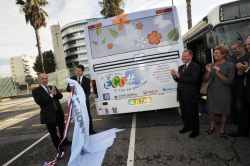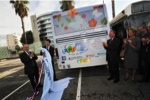
“New less polluting fuel, 20% of used and recycled cooking oil, 13% water and additives, 67% diesel,” was the message that could be read on the back of a bus parked in the parking lot of the Phoenix Park Greenhouse. All on a sky-blue background adorned with butterflies, flowers, and leaves. A visual consistent with an explicit slogan: “I drive with eco and the air is clearer.” A message that aligns with the city’s policy logic, as it involves experimenting with fuel made from recycled cooking oils. This new fuel had already been tested on the Ligne d’Azur network lines at the end of 2008 and the beginning of 2009. And since the trial proved successful (as observed by manufacturers and ADEME – the Environment and Energy Management Agency), the city of Nice decided to renew the operation. In addition to wanting to provide less polluting buses for travelers, the city also aims to reduce individual trips to encourage the use of public transport. In 2008, an initiative had already been taken in favor of the environment through the €1 pricing for bus or tram transport. “Favoring public transportation saves on purchasing power because electric energies are cheaper than fossil energies,” says Christian Estrosi, Mayor of Nice, during his intervention on environmental policy.
Mobility Week
“Move differently! Your best energy is yours.” This is the slogan of the 7th edition of Mobility Week. Initiated by the European Union in 2002, it aims to propose alternative solutions to cars. Reducing motorized traffic in urban areas is the order of the day. For 20 years, policies have been seeking alternative transport solutions to enable citizens to move around more easily. Thus, the goal of bus lanes in major cities is to make traffic flow more smoothly. The introduction of self-service bicycles has also shifted mentalities. Let’s remember that these famous bicycles, nicknamed the blue bikes, have been available in Nice since July 11, 2009. Nine hundred bicycles are available to city dwellers in 90 stations scattered throughout the city. But it’s not just the self-service bikes that are popular. According to the Ministry of Ecology, bike sales have increased: a 4% increase in bike sales was observed in 2008 compared to 2007. The same goes for car sharing. Subscribers have the possibility to use a car when they need it. Studies show that this solution led to a 57% increase in clientele between 2007 and 2008. “Societal studies show it: in the future, vehicles will have to be increasingly clean,” states Christian Estrosi. The municipality of Nice set itself the “challenge of the green wager for the Côte d’Azur, Alpes-Maritimes, and the city of Nice,” he adds. And to all those who declare they don’t want to change their habits, he simply says “keep quiet.” “You’ll see that you will have to change your behavior for the environment.”


